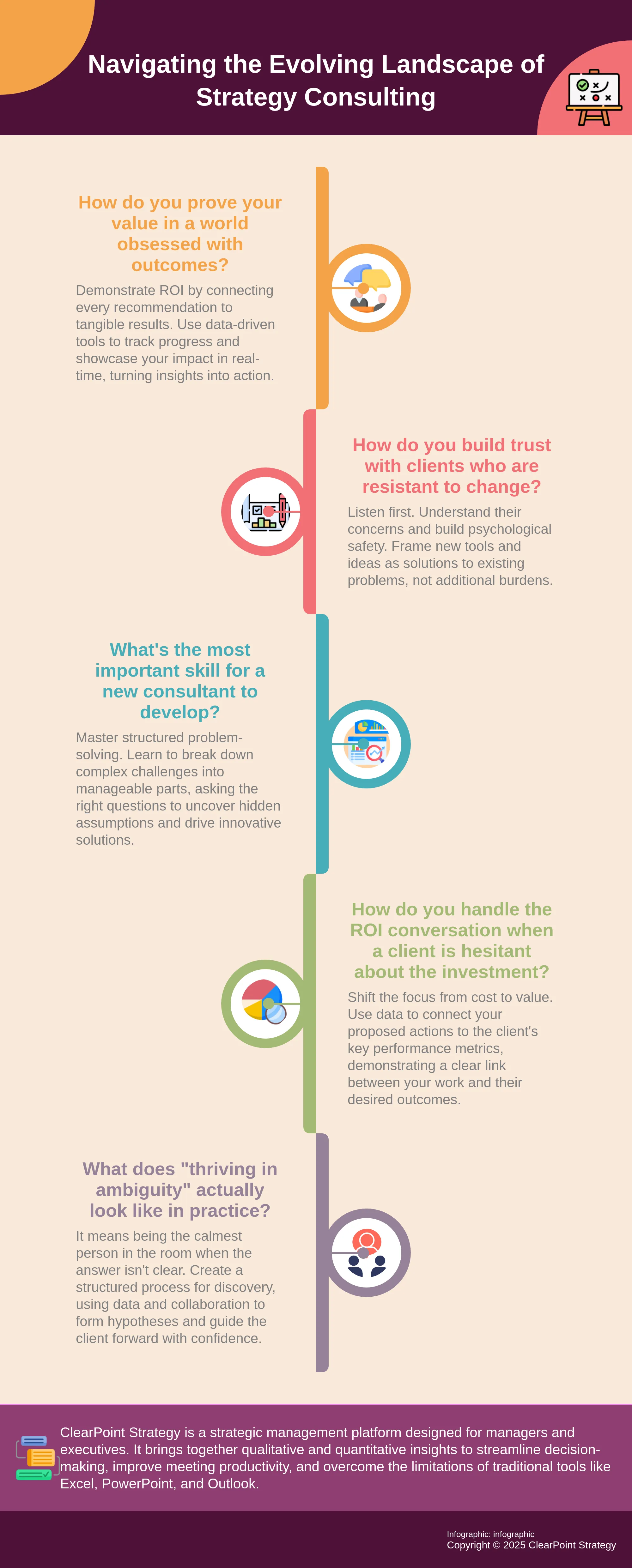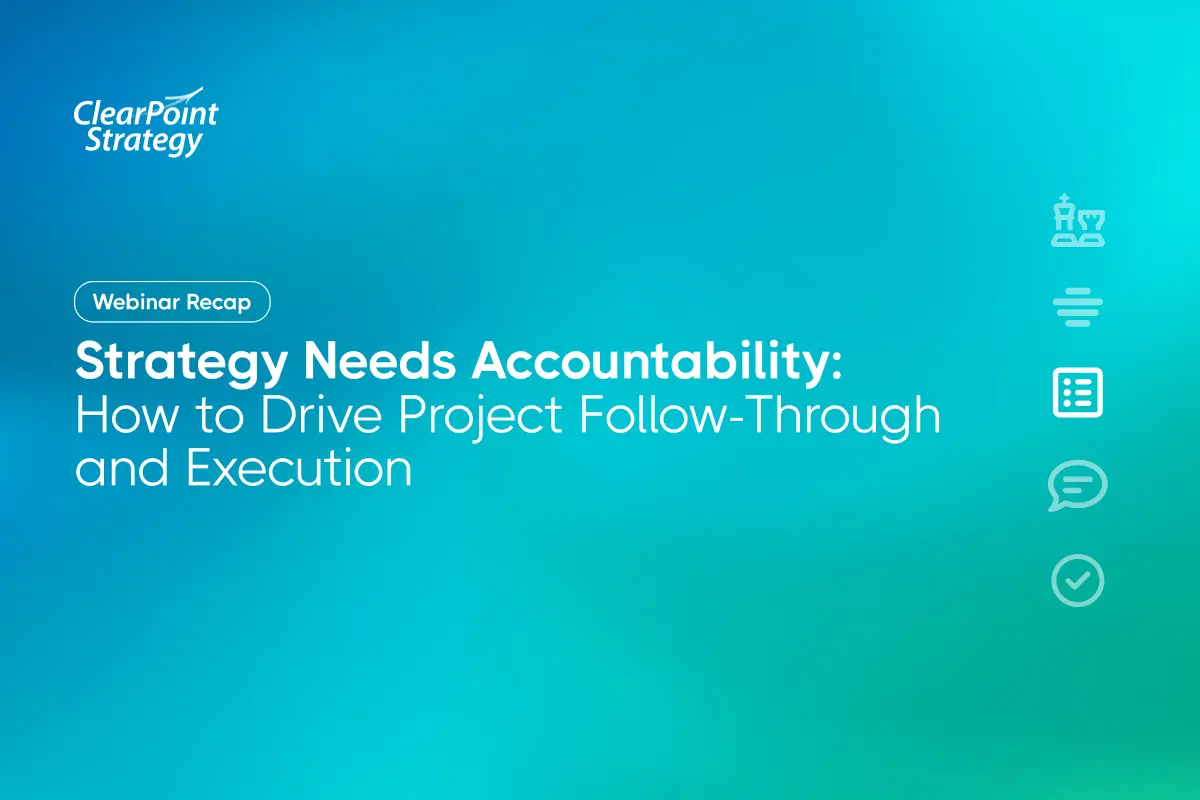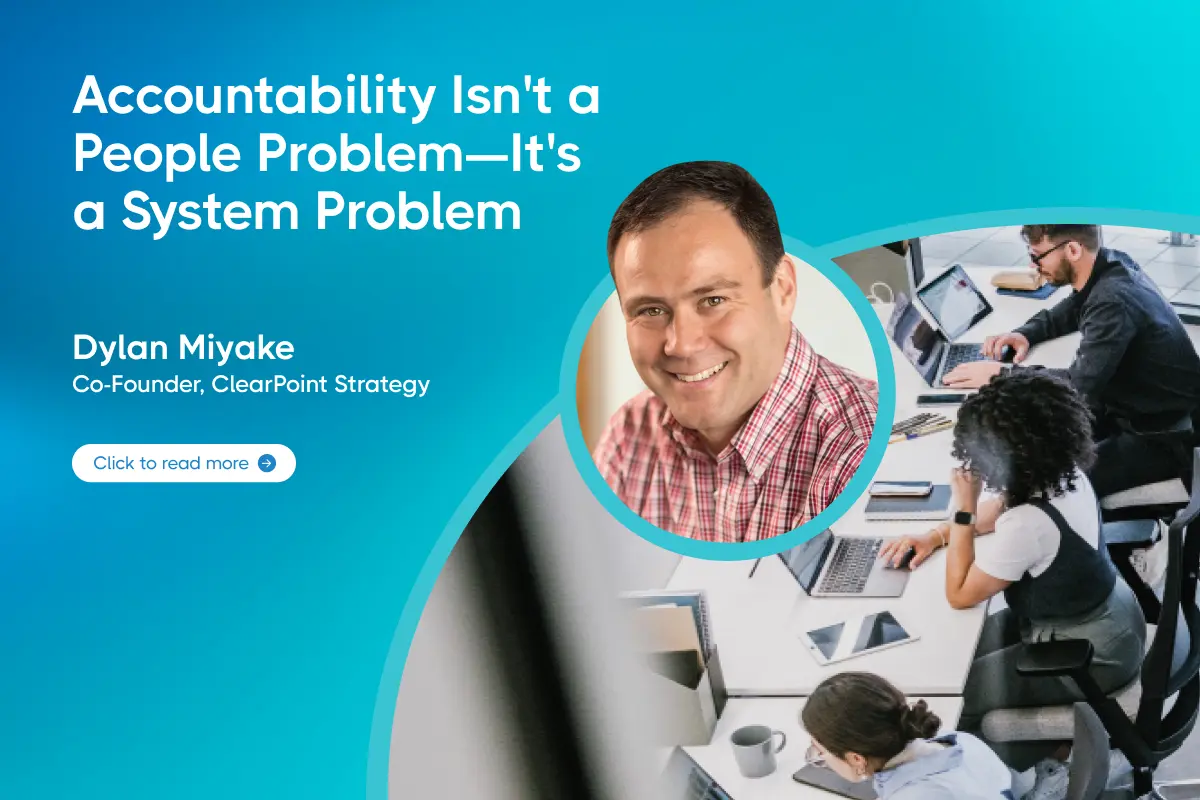Explore corporate strategy consultant success stories with actionable insights to enhance your consulting skills and drive meaningful change in organizations.
The business world is in constant motion, and the role of the strategic advisor is evolving with it. The old model of static, periodic reviews is giving way to a more dynamic, continuous approach to strategy. Today’s consultants must act as a live navigation system for their clients, helping them pivot in real time without losing momentum. This requires a deep understanding of how to integrate digital tools that provide a single source of truth, aligning the entire organization around a clear set of goals. The next generation of corporate strategy consultant success stories will be defined by this ability to guide clients through constant change, turning strategy from a document into a living, adaptable process.
Key Takeaways
- Prove Your Value Through Execution: Your impact isn't measured by the quality of your slide deck, but by the tangible, data-driven results you help clients achieve. Connect every recommendation to real-world implementation to demonstrate undeniable ROI.
- Build Relationships That Drive Change: Brilliant analysis is useless without buy-in. Build trust through authentic communication and by understanding the client's world, turning resistance into collaboration and strategic plans into shared goals.
- Turn Ambiguity into Your Advantage: The most complex challenges are your biggest opportunities to shine. Cultivate a growth mindset that allows you to stay curious, adapt quickly, and bring clarity and direction when clients need it most.
What is a Corporate Strategy Consultant?
When you hear the term "corporate strategy consultant," you might picture sharp suits and high-stakes boardroom presentations. While that’s part of the story, the role is fundamentally about one thing: helping organizations solve their most complex problems and chart a clear path forward. These consultants are external experts who bring a fresh, objective perspective to a company's biggest challenges, whether it's entering a new market, planning a major expansion, or overhauling an entire business model.
The field of strategy consulting as we know it today was largely pioneered by firms like the Boston Consulting Group in the 1960s. Since then, it has grown into a powerhouse industry dominated by what are often called the "Big Three)"—McKinsey & Company, BCG, and Bain & Company. These firms, along with many other specialized consultancies, act as strategic partners. They analyze data, identify opportunities, and provide leadership with the insights needed to make critical decisions. Think of them as a GPS for a company's journey, offering different routes and highlighting potential roadblocks to help the organization reach its ultimate destination successfully.
What do strategy consultants actually do?
At its core, a strategy consultant's job is to answer tough questions. They are professional problem-solvers who immerse themselves in a client's world to understand its unique challenges. This involves everything from analyzing financial reports and market data to interviewing employees and assessing competitive threats. While some projects might focus on cost-cutting, the broader goal is always to enhance long-term value, not just trim expenses. The best consultants understand that a strategy must be holistic, considering how changes in one area will impact the entire organization. It’s a role that hones critical skills in project management, data analysis, and communicating complex ideas with clarity and confidence.
How the role of a strategic advisor is changing
The days of a consultant delivering a slide deck and disappearing are fading fast. In an era defined by rapid technological change and economic uncertainty, clients need more than just advice—they need a partner in execution. The modern strategic advisor is expected to help implement the plans they recommend, ensuring that brilliant ideas translate into tangible results. This has shifted the focus toward building scalable, resilient strategies that can adapt in real time. As a result, consultants are increasingly relying on digital tools to track progress, manage initiatives, and provide the data-driven insights needed for agile decision-making, making strategy execution software an indispensable part of their toolkit.
What Skills Do You Need to Succeed?
Succeeding as a strategy consultant isn't just about having the right degree or a polished slide deck. It’s about cultivating a specific set of skills that allow you to transform ambiguity into action and complex problems into clear solutions. Think of these skills not as items on a checklist, but as the core components of your professional toolkit. They are what separate a good consultant from a truly indispensable one. Mastering them will allow you to deliver real, lasting value to your clients and build a career that’s both impactful and rewarding. Let's break down the three pillars of consultant success.
Master analysis and problem-solving
At its heart, consulting is about bringing clarity to chaos. Clients don't hire you for easy questions; they bring you the tangled, ambiguous challenges that keep them up at night. This is where ambiguity becomes your greatest asset. Your job is to step into that uncertainty and see opportunity. This requires more than just crunching numbers; it demands a structured, analytical mind that can deconstruct a problem, identify the core issues, and map out a logical path forward. It’s about asking the right questions to uncover insights that others have missed. Think of yourself as a detective, piecing together clues from data, interviews, and market trends to solve the case. This analytical rigor is the foundation upon which all successful strategies are built.
Build relationships through clear communication
A brilliant strategy is worthless if it stays locked in your head or gets lost in a 100-page report. Your ability to communicate your insights and build genuine relationships is just as critical as your analytical prowess. This means translating complex data into a compelling story that resonates with everyone from the CEO to the front-line manager. As one expert notes, it's often the questions you ask, not the answers you provide, that matter most. By learning to see challenges from your client's perspective, you can build the trust needed to guide them through difficult changes. Effective communication fosters the strong relationships and organizational alignment essential for turning strategic plans into successful outcomes.
Stay agile with continuous learning
The business world doesn't stand still, and neither can you. Industries are constantly being reshaped by new technologies, shifting market dynamics, and evolving customer expectations. To stay relevant and effective, you must become a lifelong learner. This means being endlessly curious and adaptable, ready to dive into a new industry or master a new technology on short notice. As noted by industry veterans, the ability to quickly acquire new knowledge is vital for addressing diverse client needs. This isn't just about staying ahead of trends; it's about embracing a growth mindset that allows you to continuously refine your skills and deliver fresh, innovative solutions in a fiercely competitive environment.
Overcome Common Consulting Challenges
Every consulting engagement comes with its own unique set of hurdles. While the specifics may change from client to client, the underlying challenges often rhyme. I’ve learned to see these moments not as setbacks, but as the very situations where a great consultant proves their worth. It’s one thing to deliver a strategy when the path is clear; it’s another to guide a client through ambiguity, resistance, and the pressure to deliver measurable results.
The most common challenges—managing expectations, proving your value, and balancing tradition with innovation—are universal. They are the proving grounds where your analytical skills, communication abilities, and strategic foresight are put to the test. Rather than dreading these obstacles, I’ve come to view them as opportunities. A skeptical client is a chance to build deep trust. A tight budget is an invitation to demonstrate undeniable ROI. A company stuck in its ways is a canvas for transformative ideas. Successfully handling these challenges is what separates a good consultant from a truly indispensable strategic partner. It’s how you build a reputation that goes beyond a single project and creates lasting impact.
Manage client expectations and resistance
Walking into a new client engagement is like entering a new country; the corporate culture, communication styles, and unspoken rules can be completely foreign. One of the first hurdles is bridging the gap between the results you know you can deliver and what the client thinks they need. Resistance often isn't about your ideas—it's about a fear of change or a history of past initiatives that fell flat.
Your first job is to listen. I’ve found that the most effective way to manage expectations is to build a strong relationship from day one. This means asking clarifying questions, being candid about potential roadblocks, and ensuring every stakeholder feels their perspective is valued. When you create a foundation of psychological safety, resistance softens, and collaboration can truly begin.
Prove your value and ROI
Clients don't hire consultants for effort; they hire them for outcomes. The pressure to demonstrate a clear return on investment is constant, and vague promises won't cut it. The key is to connect every recommendation and initiative directly to the client's most important strategic goals. This isn't just about showing your work; it's about making your value tangible and impossible to ignore.
To do this effectively, you need to move beyond static slide decks. I rely on strategic tools that allow for real-time monitoring of progress. By tracking initiatives and linking them to specific performance metrics, you can provide concrete evidence of your impact. This transforms the conversation from "Here's what we've been doing" to "Here's how our work is moving the needle on your bottom line." Seeing these successful strategy implementations in black and white builds confidence and secures long-term partnerships.
Balance proven expertise with fresh ideas
Clients hire you for your expertise, but they also expect you to bring a fresh perspective that they can't generate internally. This creates a delicate balancing act. Leaning too heavily on your established playbook can make you seem rigid, while pushing for radical, untested ideas can feel risky to a client. The sweet spot is where proven methodology meets creative innovation.
I’ve learned to thrive in this ambiguity, viewing it as an opportunity to co-create solutions with the client. Think of it like a chef using a classic recipe as a base but adding a unique, modern twist. You start with a framework you know works but adapt it to the client’s specific context and challenges. This approach respects the value of experience while leaving room for the kind of breakthrough thinking that leads to truly transformative results.
How to Thrive as a Consultant
Succeeding in consulting is one thing; thriving is another entirely. Thriving means moving beyond just delivering projects and building a career that’s both impactful and sustainable. It requires a deliberate approach to how you position yourself, make decisions, and build relationships. It’s less about a rigid checklist and more about cultivating a set of practices that will serve you for years to come, no matter how the industry evolves. Think of it as building the foundation for a long and rewarding career, not just preparing for the next client meeting.
Define your unique value proposition
In a field crowded with brilliant minds, your authenticity is your competitive advantage. What unique perspective, background, or problem-solving style do you bring to the table? This is your unique value proposition. It’s the answer to the question, “Why you?” Don’t try to be a carbon copy of a senior partner you admire. Instead, lean into what makes your approach different. This genuine stance not only attracts clients who are the right fit for you but also builds the deep-seated trust and credibility that underpins every successful consulting engagement. When you’re clear on your value, it’s easier for others to be, too.
Make data-driven decisions
Great consultants don’t just have strong opinions; they have evidence. Your recommendations carry far more weight when they are rooted in clear, objective data rather than just intuition. This is where you move from being an advisor to being an indispensable partner. By using strategic tools like ClearPoint Strategy, you can monitor complex transformations in real-time, ensuring every initiative is aligned with corporate goals. This approach allows you to tell a compelling story backed by facts, giving clients the confidence they need to make bold moves. Data provides the proof, turning your strategic advice into a clear, actionable plan with measurable strategy execution examples.
Build and nurture your professional network
Your network is one of your most valuable professional assets. In corporate strategy, you often have the opportunity to work directly with a company's most senior executives. These interactions are more than just meetings; they are chances to build relationships with people who can champion your work and support your career. Think of networking not as a transactional activity but as the practice of building a community. Cultivate genuine connections with peers, mentors, and clients. A strong professional network can open doors to new opportunities, provide critical advice, and serve as a sounding board for your most ambitious ideas.
How Do You Measure Success in Consulting?
A happy client is a great start, but it’s not the finish line. True success in consulting isn’t just about delivering a report and getting a thumbs-up; it’s about creating measurable, lasting change. If you can’t point to specific data that proves your impact, you’re leaving your value up to interpretation. The best consultants I know are obsessed with outcomes, not just opinions. They treat their own work like any other strategic initiative—by defining what success looks like from day one and tracking it relentlessly. This approach moves your role from a temporary fix to a fundamental part of the client's long-term success story.
Key metrics that matter for consultants
Your success metrics should go far beyond project completion. Think bigger. Frameworks like the Balanced Scorecard are invaluable here, as they push you to measure performance across multiple dimensions: financial gains, customer satisfaction, internal process improvements, and organizational growth. This holistic view proves you’re not just solving one problem but strengthening the entire business. To do this effectively, you and your client need a shared reality. A great strategy execution platform helps create a single source of truth for your strategy, cutting through the confusion of disconnected tools and ensuring everyone is tracking toward the same goals. This isn't just about accountability; it's about clarity.
Track your long-term impact on clients
The real test of your work comes months, or even years, after your initial engagement ends. Did the changes stick? Is the client still seeing growth? Tracking this long-term impact is what separates a good consultant from a strategic partner. This is where compelling case studies and success stories become your most powerful assets, demonstrating how your guidance leads to tangible outcomes. For example, we’ve seen how financial institutions use ClearPoint to manage and track their strategic execution, ensuring alignment long after a consultant’s project is complete. Seeing a client continue to thrive using the systems you helped implement is the ultimate metric of success. It proves you didn’t just provide an answer; you built a capability.
What's Next for Strategy Consulting?
The world of strategy consulting is in constant motion, shaped by technological leaps and economic shifts. For consultants, staying ahead isn't just about having the right answers; it's about anticipating the right questions. The future belongs to those who can blend timeless strategic principles with the powerful capabilities of modern digital tools. It’s less about predicting the future and more about building the resilience to thrive in any version of it that arrives. The days of delivering a thick binder of recommendations and walking away are over. That model is too slow, too static, and too disconnected from the daily realities of execution.
Today, clients need more than a map; they need a live navigation system. They are grappling with unprecedented complexity, and their need for clear, actionable guidance has never been greater. This means moving beyond static presentations and embracing dynamic, data-driven conversations. The consultants who will lead the next decade are the ones who can cut through the noise, connect strategy to execution, and demonstrate tangible results in real time. It’s a challenging but incredibly exciting time to be in this field, where our role evolves from being an outside expert to a deeply integrated partner in our clients' success.
Key trends and the role of digital tools
In an era defined by rapid change, the demand for sharp strategic thinking is soaring. But the old playbook of spreadsheets and quarterly reviews is no longer enough. Digital tools have moved from a "nice-to-have" to the central nervous system of effective strategy. Think of a platform like ClearPoint as a GPS for your strategy; it provides a single source of truth that guides the entire organization, eliminating the confusion that comes from disconnected plans and siloed data. This isn't just about efficiency; it's about survival. The most significant trend I see is the shift from strategy as a document to strategy as a living, breathing process. Modern strategy execution software is crucial for implementing and monitoring initiatives, allowing for real-time adjustments. This transforms the consultant's role from a periodic advisor to an ongoing partner in a client's success.
Prepare for the next wave of business challenges
The only certainty about future business challenges is that they will be different from today's. Preparing for this uncertainty requires a dual investment in technology and talent. The most competitive firms are those that not only adopt new tools but also cultivate a culture of continuous learning and adaptability within their teams. It’s about building an organization that can pivot without losing momentum. This kind of strategic agility is what separates market leaders from the rest of the pack. To help clients prepare for what's next, consultants must equip them with the ability to monitor their strategic progress in real time. When you can see how every initiative aligns with corporate goals, you can make smarter, faster decisions. This is where we focus at ClearPoint—turning complex transformations into clear, manageable plans.
Chart Your Path from Aspiring to Accomplished
Moving from a good consultant to a truly exceptional one isn’t a matter of luck; it’s a matter of strategy. Just as you map out strategic plans for your clients, you must chart a deliberate path for your own career. This journey involves more than just honing your analytical skills or mastering project management. It requires cultivating a strong personal brand that communicates your unique value and adopting a mindset that turns every challenge into a stepping stone for growth.
Think of your career as your most important client. Are you giving it the strategic attention it deserves? The most accomplished consultants I’ve known are masters of their own professional narrative. They don’t just react to opportunities; they create them. They understand that their long-term impact is built on two foundational pillars: how they are perceived in the industry and how they perceive the world around them. By focusing on these areas, you can build a career that is not only successful but also deeply fulfilling.
Build your personal brand
What do people say about you when you’re not in the room? That’s the core of your personal brand, and in consulting, it’s your most valuable asset. In a field crowded with talent, authenticity becomes your competitive advantage. Being genuine in your approach builds the trust necessary for deep client relationships and helps you stand out. Your brand is the promise of the value you deliver.
To solidify that brand, you have to move from being a service provider to a thought partner. The best way to do this is to generously share what you know. Writing articles, speaking at industry events, or even sharing insights with your network positions you as an expert. This not only enhances your credibility but also attracts the kinds of opportunities and connections that will define your career.
Adopt a growth mindset to advance your career
The business world is in a constant state of flux, and the consultants who thrive are the ones who embrace it. Adopting a growth mindset means seeing your abilities not as fixed traits but as skills that can be developed. It starts with what some call a "beginner's mindset"—the understanding that you can always learn and improve. This humility keeps you curious and open to new ideas, which is essential for innovation.
This mindset is most powerful when facing uncertainty. While many see ambiguity as a threat, seasoned consultants see it as an opportunity. Viewing complex challenges as chances for growth is what separates the good from the great. It’s in those moments of uncertainty that you can deliver the most value, bringing clarity and direction where it’s needed most. This ability to turn ambiguity into advantage is the hallmark of a top-tier strategic advisor.
What We Can Learn from Top Consultants
Over the years, I’ve noticed that the most successful consultants—the ones who drive real, lasting change—share a few core traits that have little to do with their slide decks or spreadsheets. It’s their mindset that sets them apart. They have a remarkable ability to thrive in ambiguity, seeing uncertainty not as a roadblock but as a space for innovation. They also lead with authenticity, understanding that trust is the real currency in any client relationship. But this mindset isn’t just philosophical; it’s grounded in practice. The best in the business pair their intuition with hard numbers, using real-time insights to validate their direction and adapt on the fly. It’s this blend of a curious, open mind and a commitment to data that truly distinguishes them from the rest, turning good ideas into great outcomes.
Actionable insights from industry leaders
The most effective consultants I’ve worked with don’t just bring expertise; they bring a unique perspective. They approach challenges with a beginner's mindset, asking the foundational questions that others might overlook. This practice isn't about a lack of knowledge—it's a deliberate strategy to uncover hidden assumptions and open the door to more creative solutions. They also understand that in a field crowded with jargon, being genuine builds the trust necessary for true partnership. Many leaders find that authenticity is a cornerstone of a strong professional identity. This approach is most powerful when it’s backed by a clear, data-driven narrative, allowing them to guide clients with strategies that are both insightful and defensible.
Apply these principles to your own career
So, how can you put these ideas to work? Start by consciously adopting that beginner's mindset on your next project. Ask the "obvious" questions. Challenge one of your own long-held assumptions. This isn't about feigning ignorance; it's about creating space for new possibilities. Focus on building genuine connections, moving beyond transactional updates to have real conversations about goals and obstacles. When you ground these practices in a solid strategic framework, you create a powerful combination. By building a comprehensive strategy that aligns teams and tracks progress, you give yourself the foundation to lead with confidence and clarity, turning abstract principles into measurable success for your clients.
Your Role in Shaping the Future of Business
As a strategy consultant, you’re not just an advisor; you are a catalyst for transformation. Your insights and guidance have the power to steer companies through uncertainty and position them for long-term success. This isn't about simply delivering a report and walking away. It's about embedding change that lasts, shaping how businesses operate, compete, and grow. Your role is to be the architect of that future, building frameworks that are both resilient and adaptable. How do you make that impact stick? It starts with driving real, measurable change and skillfully blending new ideas with established practices.
This responsibility requires more than just sharp analytical skills. It demands a deep understanding of organizational dynamics and the courage to challenge the status quo constructively. You are the bridge between what a company is and what it could become. By helping leaders see around corners and connecting their vision to the daily work of their teams, you create a pathway for genuine progress. The most effective consultants don't just provide answers; they build a company's capacity to find its own answers long after the engagement is over.
How consultants drive meaningful change
True impact goes beyond a compelling slide deck. It’s measured in tangible outcomes—increased market share, streamlined operations, and sustainable growth. Your job is to connect a brilliant strategy to the day-to-day work of the organization. This is where many initiatives falter, lost in the gap between the boardroom and the front lines. You can bridge that gap by introducing systems that create clarity and accountability. For instance, by implementing a platform to monitor progress in real-time, you ensure every initiative remains aligned with the company’s core goals. These are the kinds of successful strategy implementations that build your reputation and deliver lasting value for your clients.
Find the right balance between tradition and innovation
Walking into an established company, you’re often met with a deeply ingrained culture and legacy systems. Your challenge is to introduce innovation without dismissing the traditions that made the company successful in the first place. It’s a delicate balance. Pushing for a complete overhaul can trigger resistance, while being too cautious leads to stagnation. The key is to be a strategic partner who helps clients integrate new technology thoughtfully. By creating a single source of truth for their strategy, you can eliminate confusion and demonstrate how modern tools support—rather than replace—their institutional knowledge. This approach builds trust and paves the way for more ambitious transformations down the road.
Related Articles
- What is a Strategy Expert & Why You Need One
- Do You Need a Strategy Consultant or Management Software?
- Strategy Consulting: Your Guide to Business Growth
Frequently Asked Questions
Beyond the analysis and slide decks, what truly separates a successful consultant from the rest? It really comes down to the ability to be a partner in execution, not just an advisor on strategy. A good consultant can deliver a brilliant analysis, but a great one builds the trust and relationships needed to guide an organization through the difficult process of change. They translate complex data into a clear, compelling story that resonates with everyone, from the leadership team to the front-line staff. Ultimately, their success is measured not by the quality of their report, but by the client's ability to thrive long after the engagement is over.
You mention using digital tools, but how do you convince a client who is stuck in their old ways to adopt something new? This is a classic challenge, and it’s never about forcing technology on someone. The key is to frame the new tool as a solution to a problem they already have, not as another task on their to-do list. I start by listening to their frustrations—whether it's disconnected teams or reports that take weeks to build. Then, I can introduce a platform like ClearPoint not as "new software," but as a way to give them back time and provide the clarity they're missing. It’s about demonstrating how technology supports their goals and makes their lives easier, turning innovation from a threat into an advantage.
For someone just starting out, what's the single most important skill to focus on developing first? Before you can build a brand or master client communication, you must learn how to think. The most critical skill is structured problem-solving—the ability to take a massive, ambiguous challenge and break it down into logical, manageable parts. This is the foundation for everything else. It’s about learning to ask the right questions, identify the root causes of an issue, and map out a clear path forward. Once you can bring that kind of clarity to chaos, you have something of real value to offer.
How do you handle the conversation about ROI when a client is hesitant about the investment? You have to shift the conversation from cost to value, and you do that with data. Instead of making promises, you connect every proposed action directly to a key performance metric the client already cares about, whether it's revenue growth, operational efficiency, or customer retention. Using a strategy execution platform is invaluable here because it makes the connection between your work and their results visible in real time. This transforms the discussion from a subjective debate into a data-driven decision about achieving their most important goals.

The idea of 'thriving in ambiguity' sounds great, but what does that look like in practice on a difficult project? In practice, it means being the calmest person in the room when no one knows the answer yet. It’s about creating a structured process for discovery. You start by asking broad, open-ended questions to understand the landscape. You gather clues from data, interviews, and market analysis. Then, you work with the client to form a hypothesis and test it. It’s not about having all the answers from day one; it’s about having a reliable method for finding them and giving the client the confidence to move forward even when the path isn't perfectly clear.

.svg)




